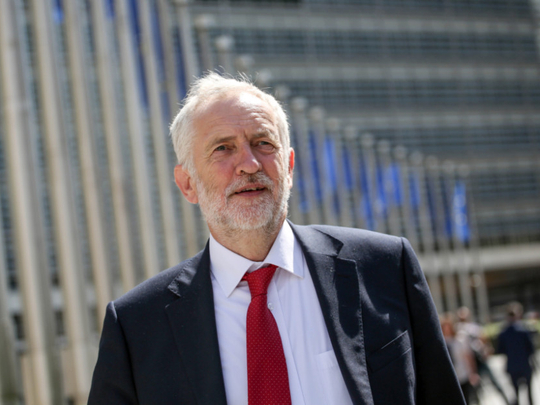
The Jeremy Corbyn chant has been declared the unofficial summer anthem of 2017. He’s still pulling crowds around the country and street murals and merchandise bearing the Labour leader’s name are everywhere. Corbynmania shows no signs of fading — and for some, this is terrible. From Foreign Secretary Boris Johnson depicting the Corbyn-cheering thousands at Glastonbury as a brainwashed cult under a spell, to commentators decrying this popularity as a scary cult of personality, the outpouring of enthusiasm for Corbyn is alternately ridiculed or depicted as dangerous. Is any of this valid?
Some Corbyn supporters will instantly dismiss the idea, thereby proving the point to those concerned. That’s part of the problem: There is an element of blind-faith fandom that shuts down the slightest criticism, however reasonable, and which is then cast as representative of Corbyn’s entire support base. It isn’t — and with cheering crowds now bolstered by Labour’s 40 per cent vote share and rising popularity in the polls, the suggestion seems increasingly incongruous.
Still, off-the-scale enthusiasm for any politician ought to elicit a note of caution even among supporters, either because no leader can live up to such expectation, or because mass devotion always carries some potential for abuse. Where such criticisms over Corbynmania fall down is over a lack of consistency. Commentators warning of a cult have for the past two years been complaining of precisely the opposite problem: That Corbyn was not sufficiently charismatic, or capable of inspiring support. Meanwhile, those same critics bemoan a dearth of decent political leadership and long for a figure they can follow — someone like the French centrist President Emmanuel Macron.
You might also recall the delight over the perceived leadership qualities of Hilary Benn, when he delivered a speech during a parliamentary debate over Syria air strikes as shadow foreign secretary in 2015. Meanwhile, the Right of the spectrum is currently wondering if the Tory MP, Jacob Rees-Mogg, could inspire a Moggmania to rival Corbynmania. In this light, concern over Corbyn’s popularity is not based on the reasonable suggestion that British politics is excessively focused on personality. It is not a commentary on the superficiality of this approach, but rather a judgement over who is deemed a worthy or acceptable recipient of voluminous support. And much of that seems to be about a perception that Corbyn’s brand of left-wing has authoritarian tendencies — an appraisal that essentially puts Corbyn in the same box as Stalin.
Clearly, no section of Britain’s political spectrum ought to be granted immunity from dastardliness. But what this particular critique seems to ignore is that, if Corbyn is trying to generate a cult of personality, his constant talk of member democracy, or of how strong leadership should be about giving people more power, is probably not the way to go about it.
Inspiring engagement
Certainly it is true that British politics is still obsessed with personality — and Corbyn supporters are necessarily a part of that frame, even while at the same time calling for a shift in emphasis on to policy and substance. But if anything is going to change this frame, it could be the engagement that Corbyn has inspired, getting people active in politics, keeping the Labour party representative of those it is intended to serve, while holding leaders to account. The member democracy Corbyn espouses is, after all, intended to move away from the centralised style of the Tony Blair era, away from pinning political hopes on to one person. It looks paradoxical, but enthusiasm for Corbyn is in part informed by this participatory democracy-building project.
Meanwhile, the idea that the seemingly Justin Bieber-fan-like devotion of Corbynmania lacks seriousness is itself a shallow analysis. It discounts the galvanising power of political credibility after decades of disillusion. And it misses the irony in the chants, street art, T-shirts and tights — all over a bearded, marrow-growing, manhole cover enthusiast. This parodying culture works as reclamation of remote, dreary politics, but the young people drawn by it are obviously not lacking in understanding of the economic crash, austerity cuts or crippling wealth inequalities.
This is why you could end up hearing insights on how a grassroots social movement might keep a Labour government accountable to its policy platform from someone in a T-shirt bearing Corbyn’s name above a Nike swoosh. It would be a mistake to read the “Oh Jeremy Corbyn” chants as a sign that those campaigning to put Labour in power are blind to the pitfalls and complexities of the task, or lacking in ambition for social and political change.
— Guardian News & Media Ltd
Rachel Shabi is a British journalist, columnist and author.










